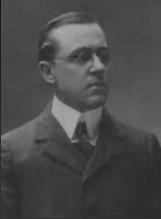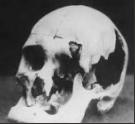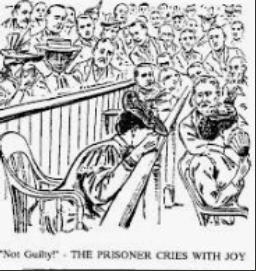It was at this point that two very crucial court rulings regarding testimony took place. These eventually would
serve as important pieces in Lizzie's eventual verdict of innocence.
1. In their attempt to enter Lizzie's testimony into the record, Robinson successfully argued that it was taken
from someone who had not yet been formally charged. The court eventually ruled in favor of the defense and
Lizzie's testimony was indeed disallowed.
2. Eli Bence, who was the drug clerk at Smith's Drug Store where Lizzie had attempted to purchase prussic
acid and whose testimony was crucial to the prosecution, was called to the stand by the prosecution. The defense
objected, citing the irrelevance of the testimony. After hearing both sides, the court again ruled against the
prosecution, saying her intent to purchase prussic acid was indeed irrelevant and ultimately inadmissible.
Eli Bence
Two key elements emphasized in Lizzie's defense were witness testimony that a mysterious young man was
seen in the vicinity of the Borden home close to the date of the murders, and Emma's declaration of a lack of any
motive for Lizzie to take the lives of her father and stepmother. In fact, Emma's staunch and vigorous defense of
her sister throughout the trial was a tremendous advantage to the defense's efforts.
At one point in the trial the prosecution attempted a risky maneuver meant to shock the
jurors and perhaps sway their sympathies toward a guilty verdict. Andrew Borden's skull was
entered into evidence as a means of graphically pointing out where the blows had been
struck. The defense cunningly turned this against them as it argued that surely anyone
committing such a vile and horrifying act that would result in such extensive damage would
be no doubt drenched in blood. Yet no one could state they at any point saw a single drop of
blood on Lizzie. It was apparent the defense case rested heavily upon creating "reasonable doubt".
It was on Monday, June 19th, that defense attorney George Robinson delivered his closing arguments with
Hosea Knowlton rebutting for the prosecution. Knowlton's closing argument concluded the following day. At long
last, Lizzie was asked if she wished to speak on her own behalf - and she did - uttering these words, "I am
innocent. I leave it to my counsel to speak for me." Justice Dewey then gave a summation of the case to the
jurors before dispatching them for their final verdict. Astoundingly, his words heavily leaned toward the defense's
perspective as he spoke glowingly of the defendant's character and acts of charity. He made a particular
emphasis that the jurors would have to weigh all this against the act she was accused of and whether they had
reasonable doubt that such a person was capable of committing these acts of violence. At 3:24 p.m., the jury
was sent to deliberations. At 4:32 p.m., in little over an hour they returned their verdict.
Clerk" "Gentlemen of the jury, have you agreed upon your verdict?"
Foreman: "We have."
Clerk" "Please return the papers to the court." (which was done)
Clerk" "Lizzie Andrew Borden, hold up your right hand. Mr. Foreman, look upon the prisoner; prisoner, look
upon the foreman.
"What say you, Mr. Foreman?"
Foreman: NOT GUILTY!"
The courtroom burst into applause which was quickly quelled by the court bailiffs. It was clear that the
overall sentiment was that Lizzie had been persecuted by the police and the prosecutors and she was now free at
last. Lizzie sat and bowed her head against the railing from where she stood and remained there silently with her
thoughts.
After the trial, the Borden sisters moved into a large, modern house in The Hill neighborhood in Fall River.
Around this time, Lizzie began using the name Lizbeth A. Borden. At their new house, which Lizbeth dubbed
"Maplecroft", they had a staff that included live-in maids, a housekeeper, and a coachman. Because Abby was
ruled to have died before Andrew, her estate went first to Andrew and then, at his death, passed to his daughters
as part of his estate; a considerable settlement, however, was paid to settle claims by Abby's family.
Despite the acquittal, Lizbeth was ostracized by Fall River society. Her name was again brought into the public
eye when she was accused of shoplifting in 1897 in Providence, Rhode Island. In 1905, shortly after an argument
over a party that Lizbeth had given for actress Nance O'Neil, Emma moved out of the house. She never saw her
sister again.






























